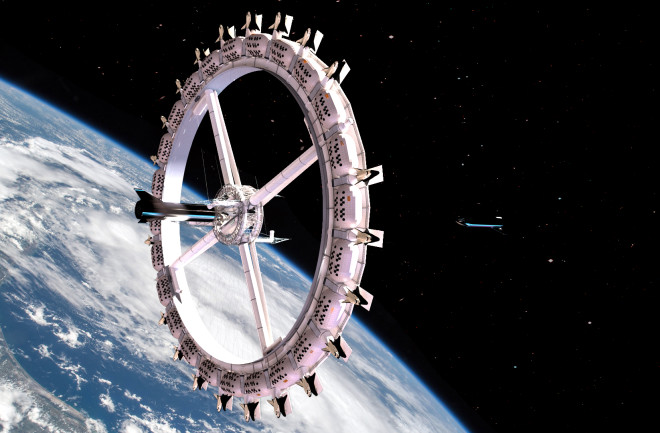The first ‘space hotel’ plans to open in 2027
[ad_1]
The word vacation conjures many images: pristine beaches, glittering ski slopes, outstretched highways and theme parks. It doesn’t call to mind cosmic journeys upon colossal rotating wheels, or vistas defined by the long arc of Earth’s surface — but it might soon.
Six decades in, the Space Age is marching steadily into its commercial phase, allowing more and more private individuals to purchase passage beyond Earth’s atmosphere. In just the past few months, the billionaires Jeff Bezos and Richard Branson have paid to cross or arrive at the edge of the Kármán line, the boundary between our atmosphere and outer space. Beside a budding clientele of Bezos and Branson stature, the era of full-fledged pleasure trips to space seems at hand, even for a multi-day escape.
To accommodate such a jaunt, the Sacramento start-up Orbital Assembly Corporation (AOC) has announced plans to open a space hotel by 2027. As the first of its kind, Voyager Station is slated to be a luxury resort designed to accommodate 280 guests and 112 crew members, complete with a restaurant, a bar, a concert hall, a gym and even a cinema.
If this sounds preposterous, Tim Alatorre, OAC’s vice president and architect behind the hotel, understands the skepticism. But it won’t be long, he insists, before such talk is commonplace. “I think it’s going to be a normal thing, where your mom went to space, your dad went to space,” he says. “Being an astronaut is not going to be a novel thing anymore, because everyone has done it.”
Celestial getaways
Right now, though, it remains emphatically novel, the stuff of humankind’s oldest dreams. For hundreds and perhaps thousands of years, Alatorre notes, the idea of traveling to space has captivated our ancestors. Indeed, Voyager’s basic structure draws on a century of theorizing about how to colonize the final frontier.
The concept of the rotating wheel, proposed in the early 1900s as a way to generate artificial gravity, was later popularized in the 1950s by the German rocket scientist Wernher von Braun (Voyager was originally named in his honor). Thanks to the centrifugal force it produces, visitors will be able to move about normally, more or less. Or, as OAC puts it on its website: “We provide gravity.”
At first its gravity level will be similar to the Moon’s, about a sixth of Earth’s. That’s roughly a revolution and a half per minute. Alatorre says they hope to spin it up to Mars level (a third of Earth’s gravity), and eventually to replicate the weightiness of our home planet. But with scant research on how humans adapt to artificial gravity, they want to better understand their guests’ physiology before raising the g-force.
Besides, for many, the lunar environment is surely part of the appeal. People with disabilities will face fewer physical barriers, while the able-bodied will find themselves capable of otherworldly athletic feats. Maybe we’ll even see a reprise of Michael Jordan’s 1996 Space Jam role? (Not that the guy needs any help defying gravity.) At the least, Alatorre expects “a lot of really good YouTube videos.”
After blasting off from Earth, guests will arrive at a central, zero-gravity docking hub. From there, elevator shafts will carry them outward to a chain of “habitation modules” arranged around the circumference of the circular station. It’s only there, at the edge of the wheel, that the centrifugal force will be strong enough to keep guests and their surroundings firmly grounded.
[ad_2]
Original Post


832 thoughts on “The first ‘space hotel’ plans to open in 2027”